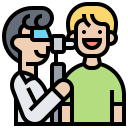
Individuals with autism may have delays in language development, difficulty initiating or sustaining conversations, or a preference for repetitive language patterns.

People with autism often struggle with social interactions and may have difficulty understanding social cues, making eye contact, or forming friendships.

Many individuals with autism display repetitive behaviors, such as hand-flapping or rocking, and may have intense interests in specific topics or objects.

People with autism may be oversensitive or undersensitive to sensory stimuli, such as sound, light, touch, or textures. This can lead to sensory-seeking or sensory-avoidant behaviors.

Individuals with autism often find it challenging to adapt to changes in routines or transitions between activities. They may prefer predictability and sameness.

Many individuals with autism display repetitive behaviors, such as hand-flapping or rocking, and may have intense interests in specific topics or objects.

Implementing early and appropriate interventions can significantly improve outcomes for children with autism.

Providing therapies tailored to individual needs can help enhance communication, social skills, and overall development.

Enhancing the ability to express needs, understand language, and engage with others.

Developing better social interaction skills and self-confidence.

Achieving greater independence in daily activities.